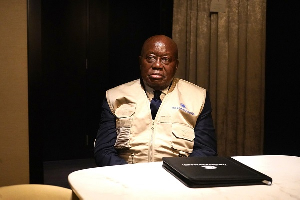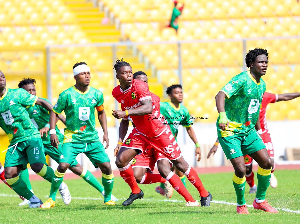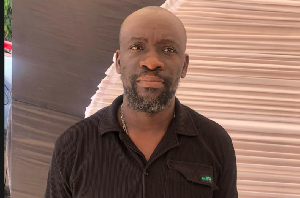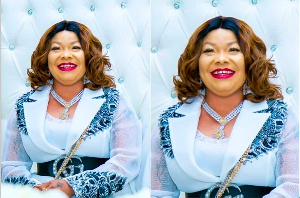(Part 2)!
JB Danquah again!
Here is the crux of the historical dilemma! JB Danquah and his team seem to be hopelessly confused about two important historical dates, 1947 JBD and 1951 JBD. In fact, Danquah, prosecutor and judge, rises to his feet and tries to raise an objection, a feeble one, of course, but the Judge, his other half in the Siamese constitution of judgeship, overrules it. “Yes, Ghana’s calendar revolves around you, Dr. Joseph Boakye Danquah, but Dr. Kwegyir Aggrey is making his point. Let him finish first,” Judge KA Busia interjects to Danquah’s chagrin, adding: “You can make your case once he is done.” The court directs its focused attention on Judge KA Busia’s twitching lips, wondering if his visibly thick lips are a result of his pugilistic thrashing by Ghana’s reigning heavy weight champion, Colonel Ignatius Kutu Acheampong.
Danquah eyes Judge KA Busia closely, quickly resuming his seat. “That Swedru illiterate called Colonel Acheampong will get you again in the ring,” he thought, smiling at Judge KA Busia, with the latter, in turn, making a wink at him. Then, a stream of rhythmic or sinusoidal barks follows the behind of Danquah as it lands on the chair. Yet there is no dog in the courtroom. “Go on, Dr. Kwegyir Aggrey!” Judge KA Busia commands. There is silence again as Dr. Kwegyir Aggrey lifts another book titled, “The Life and Work of Kwame Nkrumah,” edited by Prof. Kwame Arhin, a renowned Ghanaian scholar in the Institute of African Studies, University of Ghana. “Listen up!” Dr. Kwegyir Aggrey begins, reading and expounding further: “The debate on the Gold Coast Cocoa Marketing Board (Amendment) Ordinance, 1951, provided the opportunity for the opposition to advance such a position...” Judge KA Busia quickly cuts him short before he could finish reading, asking: “What page are you reading from, Dr. Kwegyir Aggrey?”
“Page 220.”
“Please title of the book again.”
“’The Life and Work of Kwame Nkrumah’…It is published by Africa World Press, Inc, 1993.”
“Could you go ahead and read for the court?”
“Yes, Your Honor,” replies Dr. Kwegyir Aggrey, silently cracking and snapping his fingers. The invisible dog barks again apparently for the umpteenth time. “Quote, unquote,” Dr. Kwegyir Aggrey starts the second session of his reading: “On the other hand the government’s conception of a unitary nation state directed by one strong central government affected its attitude toward cocoa revenue. For the CPP government, cocoa revenue was common national property. It therefore ought to be centrally controlled and utilized for common benefit. Accordingly it was important that the cocoa board was reorganized in order to ensure effective government control and direction of its policies through a responsible minister.” This was 1951 JDB!
Judge KA Busia swiftly jots something down on a pad of paper. “Is it the same page or a different page?” he asks, looking in the direction of Dr. Kwegyir Aggrey for a prompt response.
“Yes, Your Honor—the same page.”
Judge KA Busia jots something down again. “Do you have any witness or witnesses, Dr. Kwegyir Aggrey?”
“Yes, Your Honor.”
A gentleman gets and heads toward the witness box. His name is Tetteh Quarshie, a living legend. It turns out Tetteh Quarshie was the man who brought samples of cocoa pods to the Gold Coast, though a hospital, Tetteh Quarshie Memorial Hospital, has since been named after him. Nominal recognition is all he has to show the world for bringing immense wealth to the Gold Coast. Yet, the silent consensus in the courtroom is swiftly translated into moral questions on why Asantes are, for the most part, arrogating all the credits to themselves for the introduction of cocoa into the country? Ironically, Dr. Kwegyir Aggrey takes the opportunity to squeeze in an unrelated topic dealing with the Asante Empire and its role in the Transatlantic Slave Trade and whether the sitting Asantehene and the people of Asante should apologize to the nation.
But Judge KA Busia angrily cuts him short. On the other hand, JB Danquah and his team of lawyers disregards Judge KA Busia’s directions to cross-examine Tetteh Quarshie. Consequently, the witness vacates the witness box and joins Kwame Nkrumah and Dr. Kwegyir Aggrey at their table. “JB Danquah,” screamed both Judge JB Danquah and Judge KA Busia. “Any witnesses?” The invisible dog barked yet again. Both Judges take that to be a “No.” Court spectators begin to get apprehensive about the invisible dog and its persistent barking. Still, a few things weighed heavily on Judge KA Busia’s mind. For instance, he wonders why JB Danquah, a renowned paralegal professor, could not have distinguished between the “Amendment” of 1951 JDB and 1947 JDB Cocobod. “What kind of a legal scholar is this man? he thought. Yet both Judges are respected members of the Naturalized Losers Movement (NLM), a terrorist organization trying so hard to overthrow a democratically-elected government.
Notwithstanding the Judge’s close friendship with JB Danquah, Judge KA Busia’s first verdict is uncompromisingly swift. It renders charges (2), (3), (5), (6), and (10) null and void. Moreover, paternity tests and marriage certificate provided by Nkrumah and his lawyer shows charge (7) is untrue. Pictures and television coverage prove abundantly clear Nkrumah shared stage with Kojo Botsio, Komla A. Gbedemah, Archie Casely-Hayford, and Krobo Edusei. Charge (8) disappears as well.
Reasons? Danquah could not satisfactorily convince the court why he is Kwame Nkrumah or adequately explain why Nkrumah’s name appears on national monuments. Judge KA Busia also dismisses charges (1) and (9). In his dissenting opinion, “dissenting opinion” because some of the members of the Naturalized Losers Movement are invisibly on the case as well. Regarding charge (9), Judge KA Busia argues that when it comes to soccer Mr. Richard M. Akwei, Mr. Ohene Djan, Mr. Briton, and Kwame Nkrumah have done more to elevate soccer in Ghana and Africa than Danquah. “Nkrumah has used soccer to promote national and continental unity,” he adds.
On the question of education, the idea of the Presbyterian Teacher-Training College (PTC) being the brainchild of Akyems before the advent of Europe in Africa appears nonsensical to Judge KA Busia. Akyems did not invent Presbyterianism, neither the Presbyterian Teacher-Training College (PTC). In other words, the PTC was a non-African largesse from Europe. Also, Sir Gordon Guggisberg’s noble intentions to transform education in the then-Gold Coast was initially a solo intellectual effort on his part, though the Fanti scholar, Dr. Kwegyir Aggrey, Nkrumah’s lawyer, would contribute his own unique ideas. Other distinguished Gold Coasters of diverse ethnicities did contribute their part as well. In the end, it was Gordon Guggisberg who first made his intentions on educational reforms in the Gold Coast known to the traditional leadership of the Gold Coast, a group of whom he assembled through a committee he appointed.
Sir Gordon Guggisberg wanted an institution as competitive and influential as Sierra Leon’s Foray Bay College. That was why Achimota School, otherwise called Prince of Wales College and School, was not modeled on the PTC but on British institutions! “On the question of the founding of Ghana Academy of Arts and Sciences,” Judge KA Busia explains, adding: “that credit goes to Osagyefo Dr. Kwame Nkrumah whose initiative led the way. In fact, it is Osagyefo Dr. Kwame Nkrumah here who made JB Danquah a member of the Academy. In fact, the Academy was founded by Osagyefo Dr. Kwame Nkrumah in 1959. Simple!”
Another question is, where did Danquah get the ten charges? From the “Book of Judas” or the “Book or Urban Myth”! Invariably, the same book has alleged that Yaa Asantewaa and other pregnant women fought on behalf of the Asante Empire while their men drank palm-wine under mango trees. Could it also be true that JJ Rawlings, Kojo Boakye Djan, Halidu Giwa, and Akata Pore are Akyem, as this book eloquently says? “This book should be banned in the Ghanaian educational system!” says Judge KA Busia. Furthermore, Judge KA Busia is about to charge Danquah with perjury when…Three bullets from the pistol of Colonel Acheampong, disguised as Lt. Moses Yeboah, caught the right temple of Judge KA Busia before he could escape. He fell on the floor. Thud! Dead! He passed on with his other half in the Siamese configuration, Judge JB Danquah!
Po! Po! Po! Po! Another pandemonium. It is the band “Operation Guitar Boy” led by Lt. Moses Yeboah, Lt. Samuel Arthur, and 2nd Lt. Osei-Poku. Lt. Moses Yeboah subsequently trains his AK-47 guitar-gun on JB Danquah and shoots him in the forehead! Thud! Thud! Thud! Danquah slumps in his chair. Gone! Just three bullets. “Case dismissed,” screamed Judge KA Busia as he and others vanish through thin air. The calendar reverts to its old self KN, not JBD! 1951 JDB becomes 1951 KN. Eventually 1947 JDB becomes a thing of the past! Thus, Kwame Nkrumah built the University College of the Gold Coast, now the University of Ghana.
Was JB Danquah a rejected son of Peki, Volta Region, or of Peking, China? The next day the Daily Graphic publishes JB Danquah’s obituary. The man Danquah was not even a paralegal professor after all. He taught adult education, specifically Ewe, in Kukurantumi, a small roadside village in China before his passing! Was JB Danquah a fraud? Lucky he did not live long enough to see his ritual murder trial! His life suddenly has come full circle!
Kwame Nkrumah says “I regret it!” and takes off!
Opinions of Thursday, 1 May 2014
Columnist: Kwarteng, Francis














